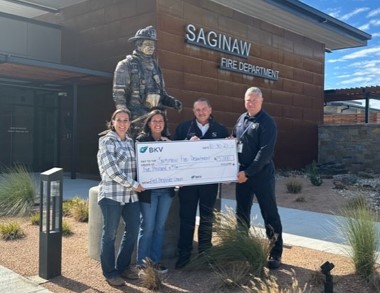BKV ซึ่งเป็นบริษัทย่อยในสหรัฐฯ มุ่งมั่นในการเป็นหนึ่งพลังร่วมในสังคม โดยสานความสัมพันธ์อย่างใกล้ชิดกับผู้มีส่วนได้เสียที่เกี่ยวข้อง โดยเฉพาะอย่างยิ่งการสร้างเสริมความสัมพันธ์กับชุมชนที่อยู่ใกล้เคียงกับพื้นที่ที่ดำเนินธุรกิจ
ในปี 2566 BKV ได้ริเริ่มโครงการ “BKV First Responder Grant Program” หรือโครงการทุกสนับสนุนสำหรับผู้ตอบโต้เหตุฉุกเฉิน เพื่อเสริมสร้างความร่วมมือกับหน่วยเผชิญเหตุฉุกเฉินในท้องถิ่น โดยการมอบงบประมาณสนับสนุนกิจกรรมต่าง ๆ ของหน่วยเผชิญเหตุฉุกเฉิน โครงการนี้เริ่มต้นด้วยการเป็นเจ้าภาพเลี้ยงอาหารกลางวันเพื่อแลกเปลี่ยนแนวคิดเกี่ยวกับความปลอดภัยและแนวทางการปฏิบัติงาน เพื่อมองหาโอกาสในการดำเนินกิจกรรมร่วมกัน
ในการนี้ บริษัทฯ ส่งหนังสือเชิญเจ้าหน้าที่ตอบโต้เหตุฉุกเฉินในพื้นที่รัฐเท็กซัส และเพนซิลเวเนียตะวันออกเฉียงเหนือให้สมัครขอรับทุนสนับสนุน โดยมีคณะกรรมการชุมชนสัมพันธ์เป็นผู้พิจารณาใบสมัครและได้มอบทุนงบประมาณสนับสนุนรวม 8 ทุน มูลค่ากว่า 30,000 เหรียญสหรัฐ
“เนื่องจากงบประมาณที่มีอยู่จำกัด การได้รับการสนับสนุนจากองค์กรท้องถิ่นจึงมีความสำคัญอย่างยิ่งในการสนับสนุนหน่วยดับเพลิงให้ได้รับอุปกรณ์ที่จำเป็นในการตอบโต้เหตุฉุกเฉิน การสนับสนุนของ BKV ภายใต้โครงการสนับสนุนงบประมาณช่วยให้หน่วยงานของเราได้มีอุปกรณ์ที่สำคัญและจำเป็นต่อการฝึกอบรมสำหรับเหตุฉุกเฉิน ทำให้มั่นใจว่าพนักงานของเราจะมีความเชี่ยวชาญในทักษะการช่วยชีวิต”
Doug Spears
ผู้อำนวยการหน่วยดับเพลิงซากินอว์

